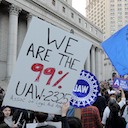
The response to COVID-19 proved that the federal government is far more capable of managing the economy than many people thought. What happens now that Bidenomics faces rising headwinds?

A discussion on global shipping, just-in-time manufacturing, and why fixing the supply chain means rethinking endless growth.

Sadé Dozan of Caring Across Generations discusses the Build Back Better bill, which would put some $150 billion into Medicaid-supported homecare services.

How do you take industrial action when your workplace is your computer? In his new book, Phil Jones considers the millions of “microworkers” around the world who process data for digital platforms.

For decades, the United Auto Workers has been controlled by a tight-knit group of insiders. Now members are voting in a historic referendum on how the union elects its central leadership.

Eve Livingston’s new book, Make Bosses Pay, aims to get young people connected to unions and to push unions to engage more with the working class as it is today: diverse, precarious, and perhaps on the brink of rebellion.

Though the occupation didn’t last long, it shaped many subsequent campaigns and movements, including in organized labor.

How did Occupy change the labor movement? And what lessons might it still hold for unions struggling to find their footing in an ever more crisis-prone world?

As hopes for ambitious climate policy fade, Joe Uehlein, Founding President of the Labor Network for Sustainability, talks about why we must decarbonize the economy while protecting workers.

Amelia Horgan’s new book, Lost in Work: Escaping Capitalism, asks what work is, why it sucks, and what we can do to change it.

If the Biden administration were serious about helping workers to build power, it would push back against the Republican governors who are ending pandemic unemployment programs early.

A replicable strategy for organizing the jobless on a mass scale has yet to emerge. The future may depend on finding one.

We should be ashamed that there are so many in food lines across the country. Unless dramatic action is taken, the lines are about to get much longer.

Contemporary automation discourse responds to a real, global trend: there are too few jobs for too many people. But it ignores the actual sources of this trend: deindustrialization, depressed investment, and ultra-wealthy elites who stand in the way of a post-scarcity society.

A massive round of Disney Parks layoffs is acutely felt in Florida.




















